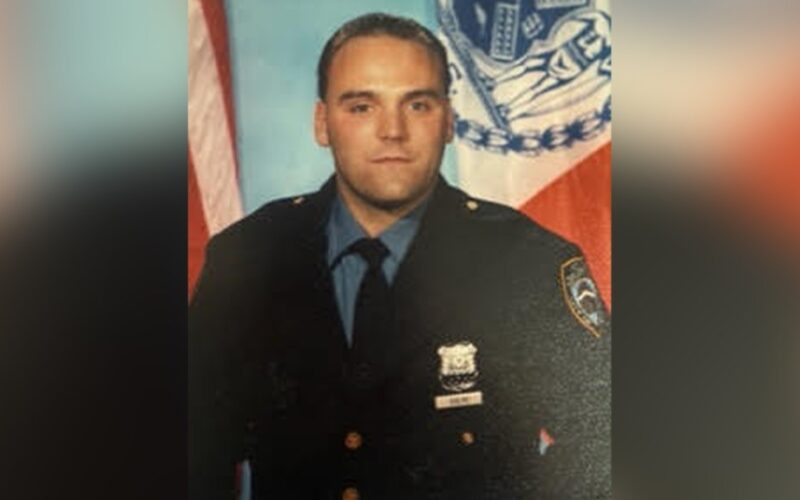An NYPD cop who reported having health problems from the toxins languishing over Ground Zero more than two decades ago has still not received any help from the federal government — because his illness hasn’t been certified by the World Trade Center Health Program amid ongoing turmoil at the CDC.
“They haven’t even looked at it,” said retired Detective Richard Volpe about about the rare kidney disease he’s been fighting for the last 22 years. “It hasn’t even been in front of the federal Victims Compensation Fund. It’s crazy to even think about it.”
Volpe, who spent six months both at Ground Zero and at the Staten Island landfill where he sifted through the mangled remains of the twin towers for human remains, suffers from IgAN Nephropathy, an extremely rare disease that destroys the kidneys.
The condition, which is also known as Berger’s Disease, is so rare that only 1.4 out of 100,000 people are diagnosed with it.
But turmoil and a lack of communication at the Centers for Disease Control and Prevention, led by President Trump’s Health and Human Services Secretary Robert Kennedy, has left 9/11 advocates in the dark. Since Kennedy took over HHS, 9/11 advocate groups haven’t been able to officially speak with anyone to learn if the WTC Health Program has verified any of the new medical conditions or if any studies are being conducted on new maladies 9/11 sufferers are facing.
That silence has left Volpe and others in limbo.
9/11
Volpe knew something was off right after the terror attack. After working the pile for two days straight, hoping to find survivors, he was finally ordered to go home and get some rest.
“After I took a shower, I needed to take a dust pan to scoop out all the soot that came off my body, that was in my ears and eyes,” he remembered. “It wouldn’t go down the drain.”
Volpe, now 58, was diagnosed with IgAN in 2003, less than two years after he was taken off the pile.
“It wasn’t only a surprise to me, but to my doctor as well, since I was a mostly healthy eater and avid gym goer,” Volpe remembered. “The other surprise was the loss of 60% kidney function in less than a year time.”

Since it was extremely rare for the condition could hit a healthy man in his 30s and be so aggressive in such a short amount of time, his doctors could find no other cause but the toxins Volpe breathed while working at Ground Zero and the Staten Island Landfill.
“I have a letter in 2004 from my doctor who believed that the kidney disease came through my lungs,” Volpe said. “And everything ingested into you body goes through your kidneys.”
But, at the time, doctors caring for 9/11 survivors were more focused on respiratory conditions stemming from Ground Zero. Volpe and fellow NYPD Detective John Walcott, whose time on the pile left him with terminal cancer, in 2004 sued the city, claiming City Hall failed to protect them from the toxic fumes. The case is still pending.
Volpe and Walcott also helped champion the passing of the Zadroga Act, which created the World Trade Center Health Program that now provides medical assistance for first responders and survivors diagnosed with one of the program’s certified medical condition.
Walcott’s cancer became a certified condition and he’s now in remission.
But Volpe’s illness has yet to become a certified condition, even though 24 more survivors have come down with the same diagnosis — a staggering number considering how rare the disease is.
9/11
Wes Parnell/NEW YORK DAILY NEWS NYC held its annual 9/11 ceremony at ground zero to honor those who passed away and served in the terrorist attacks of 9/11. (Wes Parnell / New York Daily News)
A study had been performed to determine the link between Berger’s Disease and 9/11 toxins, but the results have yet to be published, a pivotal first step in getting the condition certified as a 9/11 illness.
“I don’t know how many people were down at Ground Zero, maybe 100 to 125,000, so the odds of this disease happening to 25 of us alone should be enough to get it to the front of the line,” said Volpe, whose health problems forced him to retire in 2004 after 13 years on the job. He currently lives in Florida with his wife and two daughters.
The disease ravaged Volpe’s kidneys. About 12 years ago, he received a new kidney from an anonymous donor, but these replacements only last 15 years, he said.
“I just keep wondering if this is the year that I will be searching for a new kidney,” he said. “I feel like myself and the others that have shared my diagnosis have been lost in the shuffle. We’re not a large group of first responders with this diagnosis, but we have all suffered as much if not more than the others that have been covered.”
“Twenty-two years is a long time to be ignored,” he said.








